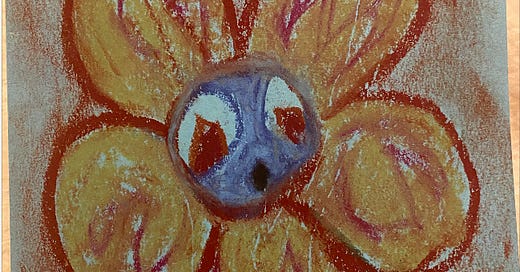You are reading Framer, a newsletter that offers re-frames so that we can imagine other realities. You can subscribe to it here:
I recently found myself at the Aspen Art Museum, where I picked up the booklet for Precious Okoyomon’s show, Every Earthly Morning the Sky’s Light touches Ur Life is Unprecedented in its Beauty.
It’s full of goodies like the poem “The Trial of the Century” by Anne Boyer, from her book A Handbook of Disappointed Fate.
This poem packs in so much ecological existential angst in so few words.
The poem is a mirror to my own hypocrisy. A “monk wrapped in meat” is so visceral, unnerving.
I don’t need a 3,000 page UN report to tell me that things are bad and only getting worse. And yet — I still get boxes of stuff delivered to my house. I still want children.
I can want what I want. The scale by which I make these personal decisions is so small.
My therapist once told me that we live out cycles by decade. Typically, 2 years before a new decade begins, we set new paths in motion that take 10 years to play out. Being only 30 at the time, I had never thought of my life in measures of 10 years. I think of my life on a monthly rhythm, maybe 1-2 years out at best.
But, the title of this poem is “Trial of the Century”.
We are currently living in the 21st century. It spans from 2001 - 2100. This isn’t about 10-year incremental changes. It isn’t about small personal decisions, it’s about collective action.
How do we set new paths in motion, systemically, knowing that they will evolve slowly?
2100 is 78 years from now. I might be 110 years old at that point. What will life look like if we continue on our current trajectory? What might life look like if our systems changed? What do you want life to look like when you’re 50, 60, 70, 80, 90, 100? What support do we need politically, economically, and societally to get there?
Perhaps if we start talking about it, imagining something different, system-wide paths can be set in motion.
This storytelling / world-building framework called EPIC LANDS offers a cool overview of all of the elements that go into building a world. It’s intended for fiction writing, but why not use it to imagine a different version of the current world we’re living in?
Here’s another way to stretch the imagination.
Max Roser offers some mind-blowing statistics in Our World In Data to think more long-term.
He estimates that as mammals, our species is expected to survive 1 million years. We’ve already survived 200,000 years, which means we have 800,000 years left if we don’t demolish ourselves. Our Earth could remain habitable for 1 billion years.
“Long-termists” believe that these timelines are plausible given that we can dedicate more resources to solving the largest issues humans face: eradicating poverty, curing disease, reducing deforestation, and improving animal biodiversity. Roser mentions a non-profit 80,000 Hours that offers guides on which careers someone might pursue to make the most impact (across a variety of skills).
I’m sitting with the complexity of relating to both the despair in Boyer’s poem and the agency in Roser’s philosophy.
What I like about “long-termism” is that it pushes me to think beyond my lifetime, to ask questions I wouldn’t have otherwise considered. I’m not blind to the fact that not everyone has the same kind of choice, not everyone has the option to focus on the issues Roser mentions. And humans don’t have a particularly good track record of coming together to avoid catastrophe.
But, American culture is deeply focused on the short term, which is to say, committed to perpetuating more of the same. The less we think about the long-term, the more we just keep it movin’. I’d like to at least start by talking more about this, creating new narratives, to stretch my perception of time.
For some further mental stimulation, here are the other book recommendations from Precious Okoyomon’s show booklet.
After Nature: A Politics for the Anthropocene by Jedediah Purdy
Demonic Grounds: Black Women and the Cartographies of Struggle by Katherine McKittrick
The Future of the Body: Exploration Into the Further Evolution of Human Nature by Michael Murphy
The Little Flowers of St. Francis of Assisi by Valentine Long
Sentient Flesh: Thinking in Disorder, Poiesis in Black by R.A. Judy
Staying with the Trouble: Making Kin in the Chthulucene by Donna J. Haraway
Uncommon Ground: Rethinking the Human Place in Nature by William Cronon
If you want to keep reading this newsletter, subscribe:






